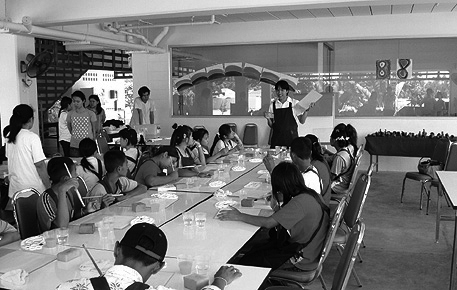Japan's Official Development Assistance White Paper 2009
(6) Transnational Crime and Terrorism
With globalization, the progress of high-tech devices, and the increasing movement of people, international organized crime and terrorism have become threats to the international community as a whole. International organized crime, including the illicit trade of narcotics and firearms, illegal immigration, trafficking in women and children, smuggling of cash, forgery of currencies, and money laundering, has been becoming increasingly diverse and sophisticated in its methods in recent years. As for terrorism, the power of international terrorism organization Al Qaeda and related organizations cannot yet be disregarded, and extremist activities by organizations that have been influenced by the ideas and terrorism methods of Al Qaeda have become a new threat. In effectively responding to international organized crime and terrorism that are advancing across national borders, efforts by a single country would be limited. Thus, in addition to the strengthening of measures by each country, it is necessary for the international community as a whole to eliminate all legal loopholes through efforts such as support for capacity building in the justice and law enforcement fields in developing countries.
<Japan's Efforts>
As for measures against narcotics, Japan proactively participates in international meetings of the United Nations Commission on Narcotic Drugs, and supports developing countries centering on Asian countries, through contributions to the United Nations International Drug Control Programme (UNDCP) of the United Nations Office on Drugs and Crime (UNODC). In FY2008, Japan contributed approximately US$4.89 million to the UNDCP Fund, and has carried out a project to strengthen crackdowns in the Asian region, a project to control narcotic substances, support for capacity building regarding criminal justice in Afghanistan, support for border management in western and southwestern Afghanistan, and support for communities of refugees in order to reduce demand for narcotics in southern Afghanistan and the border areas of Pakistan.
In regard to measures against human trafficking, Japan focuses on efforts for the social reintegration of victims, their safe return to their country, and support for them after they return to their country. In FY2008, Japan contributed US$100,000 to the Crime Prevention and Criminal Justice Fund (CPCJF) of the UNODC and provided support for various projects. Japan also provides support for the project by the International Organization for Migration (IOM) to assist victims of human trafficking to return to their country and the Bali Process, which is a framework for the Asia-Pacific region concerning illegal immigration, human trafficking, and transnational crime.
Japan invites officials in charge of the immigration control authorities of various countries, in particular Southeast Asian countries, and holds the Seminar on Immigration Control every year since 1987. Japan strengthens mutual understanding and partnership through information sharing, improves capacities of immigration personnel in each country. Moreover, Japan has held Seminars on Document Examination since 1995. The purpose has been to promote administrative technology transfer and information sharing among participatory countries by providing Japanese document examination skills and information about other developed countries.
As for measures against terrorism, Japan extends support to developing countries that do not necessarily have sufficient capacity for measures against terrorism to help them build their counter-terrorism capabilities. This is done from the perspective of depriving terrorists of the means to commit terrorism and any safe havens and overcoming vulnerabilities to terrorism. In particular, Japan focuses its assistance on preventing terrorism and ensuring safety and stability in the Southeast Asian region, which has close ties with Japan, and is thus important for Japan as well. Specifically, for example, Japan has been providing equipment, dispatching experts, holding seminars, and accepting trainees in the areas of immigration control, aviation security, port and maritime security, customs cooperation, export control, law enforcement cooperation, combating terrorist financing, counter-terrorism conventions and protocols, and others. Japan established Grant Aid for Cooperation on Counter-Terrorism and Security Enhancement in 2006 and has been strengthening its support for measures against terrorism in developing countries.
In May 2005, Japan held a workshop together with the United States, Australia, and Malaysia focusing on information sharing and collaboration between relevant organizations in the area of measures against bioterrorism. In November, Japan, ASEAN countries' ministries in charge of transportation, and relevant organizations held the third Japan-ASEAN Port Security Collective Training on communication, assuming a terrorist attack in Vietnam. Furthermore, Japan contributed US$66,000 to the UNODC Terrorism Prevention Branch and provided support for the development of counter-terrorism laws in ASEAN countries centering on Indonesia.
It is also necessary to address the issue of piracy. Since Japan depends on maritime transport for a large part of its imports of oil, minerals and other energy resources, tackling piracy on important sea lanes has a direct link to the peace and security of Japan. In order to solve this issue, measures such as strengthening maritime policing capacity of coastal states, stabilizing the situation in Somalia, enhancing information sharing, and developing human assistance are important, and Japan is providing various assistance in these fields.

Ministry of Foreign Affairs Pamphlet "Japan's Actions to Combat Trafficking in Persons"
Project for Improvement of Equipment for Maritime Security Enhancement in Malaysia
Approximately one in three large global-shipping vessels pass through the Straits of Malacca, and there are many incidents of piracy there. Strengthening the security system for the waters off the coast of Malaysia including the Straits of Malacca has become an issue. Through Grant Aid for Cooperation on Counter-Terrorism and Security Enhancement, Japan has provided small speed boats, night-vision equipment, and other items that the Malaysian Marine Police Force needs for maritime security.
Project of Art Therapy for Victims of Trafficking in Human Beings
In 2008, Japan held an art camp in Thailand through the UNODC to provide psychological care for victims of human trafficking. The art camp provides opportunities for people to learn how to express themselves through stage performance, singing, water-color painting, and clay modeling based on art therapy, and it is aimed at healing the emotional scars of victims and reintegrating them back into society. The young brothers who participated from a victim rehabilitation center in Chiang Mai had not smiled very often, but they smiled a lot as they took part in this program.

